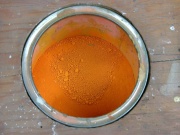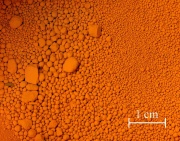Difference between revisions of "Lead chromate, basic"
(username removed) |
|||
| (4 intermediate revisions by 3 users not shown) | |||
| Line 1: | Line 1: | ||
[[File:Lead.chromate.basic_canister.jpg|thumb|Chrome red]] | [[File:Lead.chromate.basic_canister.jpg|thumb|Chrome red]] | ||
== Description == | == Description == | ||
| + | [[File:Lead.chromate.basic_det.jpg|thumb|Chrome red]] | ||
| + | An important commercial pigment called [[chrome red]]. Basic lead chromate pigment that ranges in shades from orange to red. First made in 1809 by Vauquelin, basic lead chromate is formed by heating lead chromate and sodium hydroxide solution. The color of chrome red or chrome orange can vary from a brown-yellow to a brick-red color depending on particle size and to the ratio of lead oxide to lead chromate. It is stable in light but is not widely used because of its sensitivity to sulfur gases. Most often, chrome red is used as an anticorrosive base coats for steel. | ||
| − | + | == Synonyms and Related Terms == | |
| − | + | basic lead chromate; Pigment Red 103; CI 77601; cromato básico de plomo (Esp.); cromato básico de chumbo (Port.); chrome red; chrome orange; lead chromate oxide; chromic acid lead; red lead chromate; Persian red; Austrian red; Derby red; Chinese red; Vienna red; Victoria red; American vermilion; garnet chrome; ruby red chrome; orange paste | |
| − | |||
| − | + | == Risks == | |
| − | == | + | * Human carcinogen, teratogen and suspected mutagen. |
| + | * Skin contact may cause allergies. | ||
| + | * Ingestion may cause fatal chromium/lead poisoning. | ||
| + | * Chronic inhalation may cause lung cancer and respiratory irritation | ||
| + | * American Elements: [https://www.americanelements.com/lead-chromate-oxide-18454-12-1 SDS] | ||
| + | ==Physical and Chemical Properties== | ||
Soluble in strong acids and alkalis. Insoluble in water. | Soluble in strong acids and alkalis. Insoluble in water. | ||
| Line 22: | Line 28: | ||
|} | |} | ||
| − | == | + | ==Resources and Citations== |
| − | |||
| − | |||
| − | |||
| − | |||
| − | |||
| − | |||
| − | + | * H. Kuhn, M.Curran, "Chrome Yellow and Other Chromate Pigments", Artists Pigments, Volume 1, R. Feller (ed.), Cambridge University Press: Cambridge, 1986. | |
* ''The Merck Index'', Martha Windholz (ed.), Merck Research Labs, Rahway NJ, 10th edition, 1983 Comment: entry 5423 | * ''The Merck Index'', Martha Windholz (ed.), Merck Research Labs, Rahway NJ, 10th edition, 1983 Comment: entry 5423 | ||
Latest revision as of 09:31, 16 September 2022
Description
An important commercial pigment called Chrome red. Basic lead chromate pigment that ranges in shades from orange to red. First made in 1809 by Vauquelin, basic lead chromate is formed by heating lead chromate and sodium hydroxide solution. The color of chrome red or chrome orange can vary from a brown-yellow to a brick-red color depending on particle size and to the ratio of lead oxide to lead chromate. It is stable in light but is not widely used because of its sensitivity to sulfur gases. Most often, chrome red is used as an anticorrosive base coats for steel.
Synonyms and Related Terms
basic lead chromate; Pigment Red 103; CI 77601; cromato básico de plomo (Esp.); cromato básico de chumbo (Port.); chrome red; chrome orange; lead chromate oxide; chromic acid lead; red lead chromate; Persian red; Austrian red; Derby red; Chinese red; Vienna red; Victoria red; American vermilion; garnet chrome; ruby red chrome; orange paste
Risks
- Human carcinogen, teratogen and suspected mutagen.
- Skin contact may cause allergies.
- Ingestion may cause fatal chromium/lead poisoning.
- Chronic inhalation may cause lung cancer and respiratory irritation
- American Elements: SDS
Physical and Chemical Properties
Soluble in strong acids and alkalis. Insoluble in water.
| Composition | PbO-CrO3 |
|---|---|
| Molecular Weight | mol. wt. = 546.39 |
Resources and Citations
- H. Kuhn, M.Curran, "Chrome Yellow and Other Chromate Pigments", Artists Pigments, Volume 1, R. Feller (ed.), Cambridge University Press: Cambridge, 1986.
- The Merck Index, Martha Windholz (ed.), Merck Research Labs, Rahway NJ, 10th edition, 1983 Comment: entry 5423

